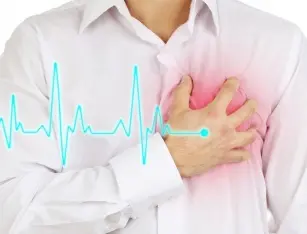Contents

You can talk about palpitations when the work of this particular muscle is disturbed, and more precisely – it accelerates. This is not always a cause for concern – our heart beats faster during physical exertion or during “ordinary” infection with fever, similarly happens in stressful situations. But, for example, during rest, the heart rhythm slows down significantly. Interestingly, pregnant women also complain of heart palpitations. Sometimes, however, disorders of this kind (generally called arrhythmias) indicate a variety of conditions that may (but do not have to) be associated with the cardiovascular system.
Heart palpitations are not always a cause for concern
Under physiological conditions, the heart performs 60-80 beats per minute, during sleep the muscle work slows down to about 40-60, and physical activity can accelerate it to 90-180 beats per minute. Heart palpitations are the body’s normal response to stress, nervous tension, excitement and fever. The heart rate also increases during pregnancy and under the influence of stimulants. Cardiac disorders should be a cause for concern if they are the result of the abuse of nicotine, alcoholic beverages, drugs or diet pills. It happens that an irregular or accelerated heart rhythm is not due to problems related to the circulatory system. It is true that palpitations – in themselves – do not have to be dangerous, but they are often accompanied by other symptoms that may have an adverse effect on the body.
When do arrhythmias appear?
Palpitations can be a symptom of supraventricular tachycardia, which is a very fast heartbeat caused by successive contractions of the atria. This is one of the most common types of arrhythmia, which can sometimes lead to fainting and even contribute to the development of heart failure. Heart palpitations are relatively often a consequence of electrolyte disorders (especially potassium deficiencies). They suffer from excessive alcohol consumption (during the so-called hangover). Diarrhea and vomiting also lead to similar pathologies. Cardiologists collectively refer to this symptomatic syndrome as “Saturday night syndrome” – when, as a result of stimulants, dehydration of the body and the toxic effects of substances taken, the heart rhythm significantly speeds up or loses its physiological regularity. It must be borne in mind that dehydration also accompanies high temperatures, so you must not forget to hydrate your body on hot days.
Heart palpitations – what is worth knowing about it?
In some cases, the causes of palpitations must be sought outside the circulatory system. Illness can be caused by adrenal disease, hyperthyroidism, hernia or gastroesophageal reflux disease. If heart problems are related to physical activity or a stressful situation, rest and relaxation are usually enough to bring the heart rate back to normal. It is worth learning to control your nerves – various relaxation techniques, calm music, yoga will help. People who have noticed an abnormal heart rhythm should avoid stimulants, so do not drink alcohol, quit smoking, give up coffee and do not use drugs. Regular heart rate is also helped by a sufficiently long and effective sleep and regular physical activity – aerobic exercise is especially recommended.









